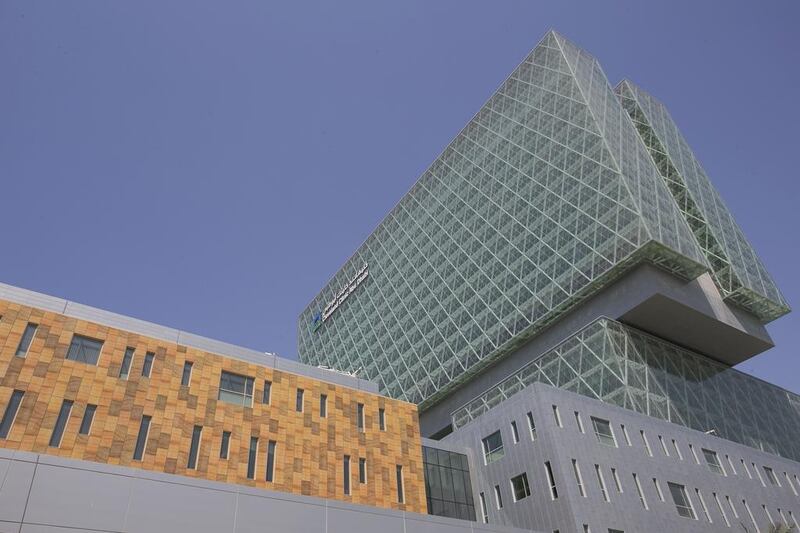ABU DHABI // Cleveland Clinic Abu Dhabi, one of the emirate’s most-anticipated flagship projects, has started to accept patients.
The medical campus on Al Maryah Island, which represents one of the biggest health investments in Abu Dhabi, opened its eye clinic on Tuesday, where patients can receive treatment for conditions such as cataracts, cornea diseases and glaucoma.
Other services are expected to start over the next 10 weeks.
These will include internal medicine, infectious diseases, rheumatology, pain management, nervous system, brain and spine, digestive health, urology and kidney, dermatology and plastic surgery.
Accident and emergency will be the last department to open, on May 31.
Dr Marc Harrison, chief executive of CCAD, said: “We are thrilled to welcome patients to our eye institute and are honoured to begin delivering on our promise to provide world-class care to our patients here in the UAE.
“Our mission is to provide compassionate, patient-centred care of the highest quality to the people of Abu Dhabi.”
The hospital, developed by Mubadala Healthcare, a unit of Mubadala Development, will currently accept only Thiqa card-holders, who are exclusively Emirati, people with select Daman enhanced plans, and those who are self-funding.
Residents can ring a contact centre to find out if their plan is covered at the hospital.
The 409,234-square-metre hospital is predominantly modelled on the Cleveland Clinic in the United States.
“Patients walking through the doors of Cleveland Clinic Abu Dhabi are going to receive the same quality of care as they would expect to receive at Cleveland Clinic in the US, which has been tailored to local needs and culture,” said Dr Harrison, who has had a 16-year career with Cleveland Clinic.
“This will enable our patients to stay close to their families and loved ones – their strongest support system – while being treated for complex medical issues. ‘Patients First’ is our guiding philosophy and shapes the decisions we make every day.
“It also underpins how our measured approach to opening services at the hospital ensures high quality care and patient safety.
“Over the next few weeks, we’ll be announcing additional services related to digestive diseases, heart and lung conditions and much more.”
Dr Scott D Smith, chief of the eye institute at the hospital, said he was excited to start seeing patients.
“We have taken the very same approaches, processes and techniques that are used at Cleveland Clinic in the US and are offering them here at Cleveland Clinic Abu Dhabi,” he said.
“This means that our patients will have access to leading expertise and the latest technology for diagnosis and treatment.”
CCAD has 364 beds, with the option to increase that to 490, including 72 intensive-care unit beds, four post-anaesthesia care units and 26 operating rooms.
About 5,500 doctors applied for the 175 positions at the hospital, which has also employed more than 1,000 nurses and other health professionals.
The 23-acre site has five clinical floors, three diagnostic and treatment levels and 13 floors of critical and acute inpatient units.
It will have more than 30 medical and surgical specialities and is designed to operate five different specialist centres of excellence covering digestive disease, eye, heart and vascular disorders, neurological treatment, and respiratory and critical care.
Minimally invasive robotic surgery and advancements in treatments for patients with epilepsy and irritable bowel diseases will be among the new areas of medicine the hospital will focus on.
The site, which aims to complement existing healthcare facilities in the emirate, will also have a dedicated organ transplant centre.
It will have the capacity for 3,100 car parking spaces, 20,000 pieces of medical equipment, 30,000 pieces of furniture and a 200-seat auditorium.
Dr Harrison said the hospital also aimed to be one of the first fully digital hospitals in the world, with the ultimate goal of being almost paperless.
jbell@thenational.ae






